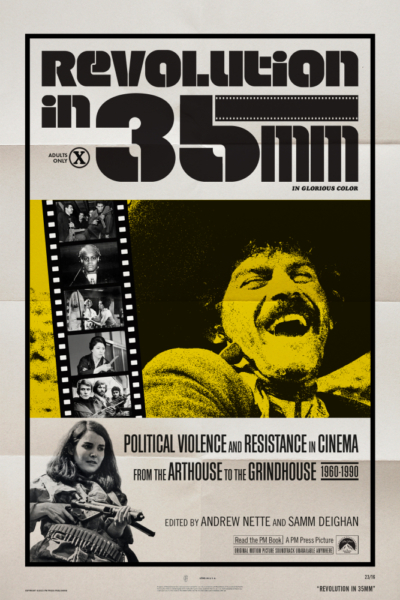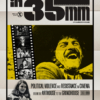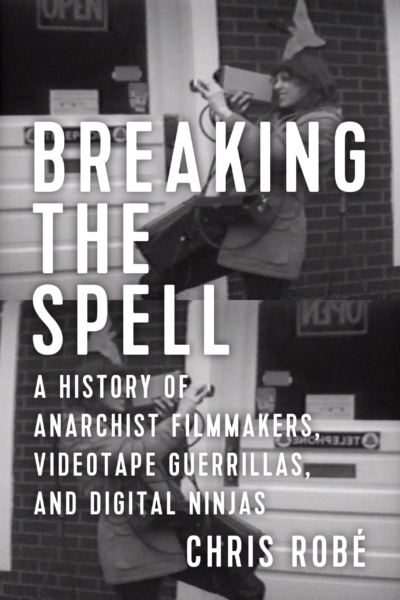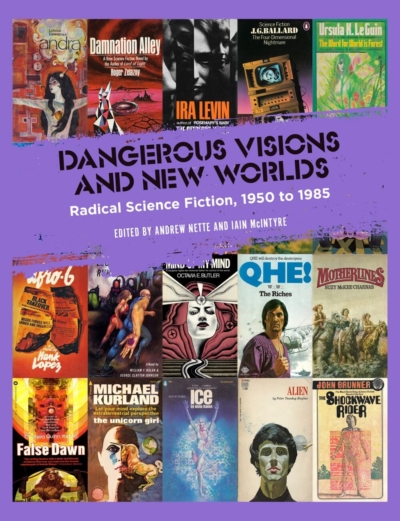Revolution in 35mm: Political Violence and Resistance in Cinema from the Arthouse to the Grindhouse, 1960–1990 examines how political violence and resistance was represented in arthouse and cult films from 1960 to 1990.
This historical period spans the Algerian war of independence and the early wave of postcolonial struggles that reshaped the Global South, through the collapse of Soviet Communism in the late 1980s. It focuses on films related to the rise of protest movements by students, workers, and leftist groups, as well as broader countercultural movements, Black Power, the rise of feminism, and so on. The book also includes films that explore the splinter groups that engaged in violent, urban guerrilla struggles throughout the 1970s and 1980s, as the promise of widespread radical social transformation failed to materialize: the Weathermen and the Black Liberation Army in the United States, the Red Army Faction in West Germany and Japan, and Italy’s Red Brigades. Many of these movements were deeply connected to culture, including cinema, and they expressed their values through it.
Twelve authors, including film critics and academics, deliver a diverse examination of how filmmakers around the world reacted to the political violence and resistance movements of the period and how this was expressed on screen. This includes looking at the production, distribution, and screening of these films, audience and critical reaction, the attempted censorship or suppression of much of this work, and how directors and producers eluded these restrictions.
Including over two hundred illustrations, the book examines filmmaking movements like the French, Japanese, German, and Yugoslavian New Waves; subgenres like spaghetti westerns, Italian poliziotteschi, Blaxploitation, and mondo movies; and films that reflect the values of specific movements, including feminists, Vietnam War protesters, and Black militants. The work of influential and well-known political filmmakers such as Costa-Gavras, Gillo Pontecorvo, and Glauber Rocha is examined alongside grindhouse cinema and lesser-known titles by a host of all-but-forgotten filmmakers, including many from the Global South that deserve to be rediscovered.
Book Details:
Editors: Andrew Nette and Samm Deighan
Publisher: PM Press
ISBN: 9798887440606
Published: October 2024
Format: Paperback
Size: 6 x 9
Pages: 384
Subjects: Film / History & Criticism
Praise
“Andrew Nette, Samm Deighan, and their boisterous band of noteworthy collaborators serve up an impressive, breathlessly globetrotting tour of Cold War–era left-wing cinemas of resistance in this beautiful volume. Movie lovers will find a new trove of treasures to screen; film aficionados will dive into the debates stimulated by these provocative contributions.”
—Jonathan Kirshner, author of Hollywood’s Last Golden Age
“Navigating the rivers of blood between exploitation films, revolutionary cinema, and beyond, this is a vital, lively, necessary book for anyone interested in cinema, politics, or both. Nette and Deighan seem to have seen everything, and they make connections that change and deepen our understanding of the moving image, the moving world.”
—Howard A. Rodman, former president of Writers Guild of America West
“Revolution in 35mm is a fantastic collection of essays, as vital and compelling as the films they analyze. The authors engage in the cinema of the time mindful of the context but also underline the relevance of the work today. Highly recommended.”
—John Bleasdale, host of the podcast Writers on Film
“The writing in Revolution in 35MM not only conveys a wholehearted enthusiasm for a diverse cross-section of cinema from around the world, but thoughtfully considers the socio-political conditions these films were aiming to challenge. An invaluable blend of cultural history and film critique, the book is a celebration of iconoclasts who channeled righteous anger into all manner of ‘political cinema,’ whether by attacking issues directly or covertly smuggling topical themes into popular genre fare. Even the most seasoned cinephile will come away with dozens of unfamiliar titles to seek out.”
—Bill Ackerman, host of the podcast Supporting Characters
About the Editors
Andrew Nette is an author of fiction and nonfiction. He is coeditor of three previous books for PM Press, Girl Gangs, Biker Boys, and Real Cool Cats: Pulp Fiction and Youth Culture, 1950 to 1980; Sticking It to the Man: Revolution and Counterculture in Pulp and Popular Fiction, 1950 to 1980; and Dangerous Visions and New Worlds: Radical Science Fiction, 1950 to 1985. His writing on film, books, and culture has appeared in a variety of print and online publications. He has also contributed video and print essays and commentaries to a number of DVD/Blu-ray releases. He writes a regular newsletter under his name on Substack.
Samm Deighan is a film historian and the author or editor of several books, including of The Legacy of WWII in European Art House Cinema (2021) and a monograph on Fritz Lang’s M (2019). She’s a special features producer for Vinegar Syndrome and cohosts the Twitch of the Death Nerve podcast.






